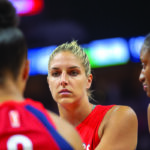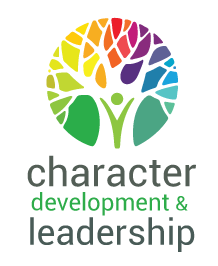
“You gotta be you. It’s really difficult and exhausting trying to be somebody that everybody wants you to be.”
Watching Elena Delle Donne interact with Lizzie, her older sister, is a beautiful thing. They have a strong bond based on love and empathy. Elena is a professional basketball player in the WNBA. In contrast, Lizzie was born deaf and blind. She also has cerebral palsy, is autistic, and functions at the level of a three-year-old. Nevertheless, the sisters have an unusually strong bond. Their interactions always begin with an embrace because they rely on touch and smell to communicate and relate to each other. These embraces often last minutes and, sometimes, hours. Elena lets Lizzie know that she is present by bending over and allowing Lizzie to smell her hair. Elena then strokes her arm and her hand. Even when they are sitting side-by-side Lizzie frequently reaches out to Elena to make sure she still is there. No words are exchanged and smiles and laughter can only be detected when Lizzie places her hands across Elena’s mouth. Lizzie communicates what she wants by using elementary hand gestures that Elena quickly interprets. It becomes clear to anyone who sees them that Lizzie and Elena both gain a great deal from their relationship.
The two sisters could not have been physically more unalike. For example, Elena was always tall. In fact, she was at a grocery store when a complete stranger told her mother that “an eight-year-old child should not use a pacifier.” Elena was only three at the time. Later on, when Elena entered the 8th grade, she was 6 feet tall. That was also the year in which Elena began receiving scholarship letters from college basketball coaches. These coaches had good instincts. In high school, Elena would lead Ursuline Academy to three straight Delaware State championships. In 2008, she was rated as the number one rated high school basketball recruit in America.
Upon graduating from high school Elena accepted a basketball scholarship from Geno Auriemma, the head coach at the University of Connecticut, the top-ranked women’s program in America. Elena arrived early on campus in the summer to settle in with her new team. Two days later, she left campus in the middle of the night without telling anyone. Once back home, she left Auriemma an apologetic voice mail saying that she was leaving UConn because she was “burned out” and “home sick.”
Coach Auriemma’s response to this was, “Come on, this is a joke. There’s no way that this happened. Two days? Shocked – how else can I explain it?” Would-be teammates called her a quitter. Social media called her much worse names. Everyone had a theory about why Elena went back home. However, Elena knew the truth. She flat-out missed her older sister too much.
Given Lizzie’s situation, they could not call, write, text or speak to communicate. These sisters have an unspoken love that needs to be communicated through personal contact. As Elena affectionately summed it up, “Touch is everything to her. Touch is her comfort.”
“Lizzie doesn’t know that I play basketball. She doesn’t know that I’m 6’5… She just knows that I’m one of her people and a really important person in her life.” When Elena checked into campus, she also checked out of Lizzie’s life, which was just too far of a bridge to cross. Elena missed her sister too much. The joy went out of her life. She no longer had that spark in her eye. She immediately recognized that her relationship with Lizzie was far more important than continuing her basketball career away from home. So, although others thought Elena was crazy or weak, she knew that she would be exercising good judgment by choosing to remain closely involved in her sister’s life.
person in her life.” When Elena checked into campus, she also checked out of Lizzie’s life, which was just too far of a bridge to cross. Elena missed her sister too much. The joy went out of her life. She no longer had that spark in her eye. She immediately recognized that her relationship with Lizzie was far more important than continuing her basketball career away from home. So, although others thought Elena was crazy or weak, she knew that she would be exercising good judgment by choosing to remain closely involved in her sister’s life.
Subsequently, Elena enrolled at the University of Delaware. It was only 20 minutes from her house and for the next 6 months, she did not so much as touch a basketball. Instead Elena “walked on” to Delaware’s volleyball team and was content and happy as she lived the life of a typical college student. With Lizzie once again by her side, Elena’s joy returned. Staying home while attending college clearly was the right decision for her. Therefore, Elena was ready to give basketball another shot when Delaware’s basketball coach soon came a-calling.
 The University of Delaware was hardly a basketball power. The Blue Hens played in the Colonial Athletic Association and had neither tradition nor pedigree. However, Elena applied herself and her talent began to shine through. In her freshman season, she averaged 27 points per game. She was named both the Colonial Athletic Association’s Rookie of the Year and Player of the Year. During her junior and senior years, she led the Blue Hens to near-perfect records of 31-2 and 32-4. Each team advanced to the NCAA tournament. During her senior year, the Blue Hens made it to the Sweet 16 before getting beat by Kentucky.
The University of Delaware was hardly a basketball power. The Blue Hens played in the Colonial Athletic Association and had neither tradition nor pedigree. However, Elena applied herself and her talent began to shine through. In her freshman season, she averaged 27 points per game. She was named both the Colonial Athletic Association’s Rookie of the Year and Player of the Year. During her junior and senior years, she led the Blue Hens to near-perfect records of 31-2 and 32-4. Each team advanced to the NCAA tournament. During her senior year, the Blue Hens made it to the Sweet 16 before getting beat by Kentucky.
Some might observe that Elena missed out on the notoriety of playing big-time college basketball and winning multiple national championships at UConn. However, Elena was happy. “Life is way more than a game,” she explained. “You need to be happy. You need to enjoy yourself.” Elena did things her way; not the way others thought she should do things. She made the best decision for her, given her unique circumstances. As she so eloquently explained, “I’d rather be a face for happiness and doing things that you have a passion for, rather than faking it and pretending like I’m this face of women’s basketball, when I can’t stand the sport at all.”
 After her collegiate career at the University of Delaware, Elena was selected as the 2nd pick in the 2013 WNBA Draft. So far, her career has been a huge success. She began her career as a member of the Chicago Sky. She received the WNBA MVP as she led that 2015 team to the WNBA Finals. She had similar results when she was traded to the Washington Mystics in 2017, which placed her about two hours from her sister. In 2019, she also received the league MVP as she led her team to the WNBA Finals. In the fifth and deciding game of the WNBA Finals, playing with three herniated discs, Elena scored 21 points to lead this franchise to their first WNBA Championship.
After her collegiate career at the University of Delaware, Elena was selected as the 2nd pick in the 2013 WNBA Draft. So far, her career has been a huge success. She began her career as a member of the Chicago Sky. She received the WNBA MVP as she led that 2015 team to the WNBA Finals. She had similar results when she was traded to the Washington Mystics in 2017, which placed her about two hours from her sister. In 2019, she also received the league MVP as she led her team to the WNBA Finals. In the fifth and deciding game of the WNBA Finals, playing with three herniated discs, Elena scored 21 points to lead this franchise to their first WNBA Championship.
Elena continues to make good decisions based on what she knows is right for her and others around her. For example, in 2017, she married her longtime companion Amanda Clifton. Historically, gay individuals in professional sports have attempted to hide their true feelings. They often remained “in the closet” and continued to date and even marry individuals from the opposite gender. Elena neither has the time nor the inclination for such games. She needs to be authentic: “You gotta be you. It’s really difficult and exhausting trying to be somebody that everybody wants you to be.”
Elena continues to devote herself to issues that are near and dear to her heart. She is passionate about children with special needs. As such, in 2014, she was named the Special Olympics Global Ambassador. She also started a charitable foundation to benefit the Special Olympics and Lyme disease (a disease with which Elena has struggled most of her life). And, as you might expect, Elena still spends a great deal of time caring for her sister, Lizzie. She takes care of her in the off-season and fully understands that she will become the full-time caregiver of Lizzie when her parents are no longer able to do so. “That’s my girl,” Elena stated with conviction. “I’m not going to let anyone else take Liz in.”
In so many ways, Elena is a positive role model. She has blazed her own trail and done things her own way. She encourages us to follow our heart and passions in life: When all is said and done, each of us has only one life to live. Elena suggests that it might be wise to lead our lives in ways that make us happy and fulfilled as opposed to doing what others think we should do. Elena reminds us all that we are the authors of our own lives.
Discussion Questions
- After being the number 1 recruit in America, Elena left UConn after 2 days. In your own words, tell us why.
- Describe Elena’s relationship with her sister.
- After she dropped out of UConn, where did she go to college? How did that work out?
- Elena is gay. It would have been easy to hide that aspect of her life. Instead she chose to be authentic. How did she do this?
- How would you define the term, empathy? How does Elena exemplify with her sister?
- What inspires you about Elena’s life and how can her example make you a better person?

Another extraordinary motivating message which will inspire MANY
Thanks for sharing and motivating others